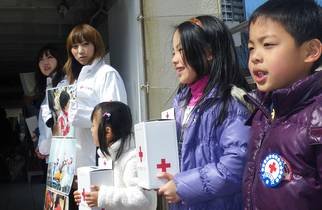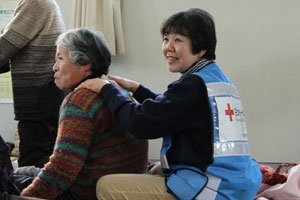Domestic Disaster Response
In Japan, - an earthquake-prone country that is also often affected by other natural disasters such as storms and floods - a rapid, effective disaster response in times of emergency is crucial. Providing such a response is an important mission of the Japanese Red Cross Society (JRCS).

The JRCS is listed as a "Designated Public Corporation" under the Disaster Countermeasures Basic Act. According to the Disaster Relief Act, the JRCS has the obligation to cooperate with the national and prefectural governments in the provision of relief assistance, the details of which are laid out in the agreement signed by the Minister of Health, Labour and Welfare and the President of the JRCS. Based on this, the JRCS is developing disaster relief responses according to relief regulations and disaster management plans. Additionally, as a member of the Central Disaster Management Council headed by the Prime Minister, and in collaboration with other organizations, the JRCS is responsible for a part of the country's overall disaster management.
In times of emergency, the JRCS carries out the activities shown below to support disaster victims.
Medical Relief

In order to be prepared for disasters, the JRCS has formed 500 medical relief teams (approximately 6,500 people) comprised primarily of doctors and nurses from the 91 Red Cross Hospitals across the nation. If a natural disaster arises, response teams (6 members per team) and dERU (domestic Emergency Response Units) are dispatched to the affected area. They will collaborate to set up aid stations, conduct medical diagnoses, and provide psychological care.
Stockpiling and Distribution of Relief Supplies
The JRCS maintains, at all times, emergency stores of blankets (approximately 210,000 nationwide), sleeping kits (mats, eye masks, etc., which can be used in evacuation centres to help victims rest more easily - approximately 31,000 sets), and emergency relief kits (approximately 72,000 sets that contain daily necessities that can be useful in an emergency).
Provision of Blood Products
In order to smoothly secure and provide blood products required by medical institutions nationwide in times of emergency, the JRCS maintains a stock of products at each blood centre while also operating a system to regulate blood supplies throughout the country.
Collection of Donations

The JRCS accepts donations for disaster victims and distributes them through donation distribution committees organized by charity organizations and government agencies in the affected areas.
Disaster Volunteer Activities

JRCS disaster volunteers are trained on a regular basis and perform a variety of services during an emergency. This includes gathering information, administering first aid, preparing hot meals, tracing, transporting and distributing relief supplies, and offering support to victims at evacuation centres.
Psychological Care

Disasters can cause a great amount of distress and subsequent psychological damage to people, through factors such as the loss of loved ones, or the emotionally harsh and often physically uncomfortable living situations in evacuation centres. The JRCS strives to alleviate the suffering of disaster victims by providing psychological care as a part of the medical care it offers in these centres.
The JRCS' domestic disaster response activities are carried out primarily by the main chapter closest to the affected area. In the case of a large scale disaster, chapters work together to dispatch the necessary personnel, and to transport relief supplies to the chapters closest to the various disaster zones. The National Headquarters gathers information and regulates relief activities across the country.
As a "Designated Public Corporation" under the Civil Protection Law (as well as the Disaster Countermeasures Basic Act mentioned above), the JRCS has the obligation to protect citizens in the case of an armed attack or a similar situation within the country. For this reason, the JRCS has put together a fully operational plan to keep citizens out of harm's way should such a situation arise.




